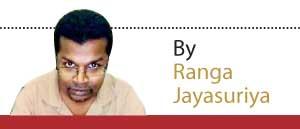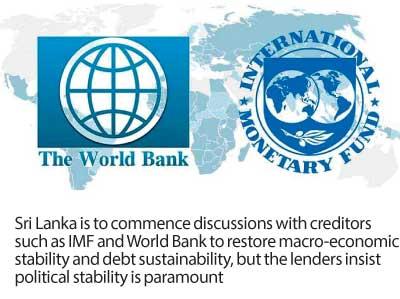Reply To:
Name - Reply Comment
Last Updated : 2024-04-25 15:57:00
- The existing status quo cannot go on longer, no matter how hard the government tried
- Sri Lanka has two options: First is an all-party government that President Wickremesinghe is said to be exploring and the second option is snap elections
The resignation of Gotabaya Rajapaksa and his succession by Ranil Wickremesinghe, the incumbent did not create political stability in Sri Lanka, instead, it has led to a sinister deadlock that would explode anytime. Paradoxically enough, the developments since the self-exile of Gotabaya had reversed the limited political gains of the mass protests. The election of Ranil Wickremesinghe through a Parliamentary vote, through overwhelming support by the Rajapaksa’s Sri Lanka Podujana Peramuna (SLPP), and thanks to the manoeuvring by the disgraced Rajapaksa brother, Basil, resulted in the old guard’s return to power through proxy.
create political stability in Sri Lanka, instead, it has led to a sinister deadlock that would explode anytime. Paradoxically enough, the developments since the self-exile of Gotabaya had reversed the limited political gains of the mass protests. The election of Ranil Wickremesinghe through a Parliamentary vote, through overwhelming support by the Rajapaksa’s Sri Lanka Podujana Peramuna (SLPP), and thanks to the manoeuvring by the disgraced Rajapaksa brother, Basil, resulted in the old guard’s return to power through proxy.
Ranil Wickremesinghe now rules the country under the Emergency Regulations, not even Gotabaya Rajapaksa resorted to the draconian measures as resolutely as his successor. Whenever the latter announced emergency regulations during the past six months, the state of emergency lapsed without being approved in Parliament. (The beleaguered Gotabaya might not have got enough votes to pass the emergency regulations, but in the last months of his rule, he was not as inclined as his successor to resort to suppression.) His one-time erstwhile acolytes, such as Wimal Weerawansa and Sanath Nishantha have publicly criticized Gotabaya for his lack of enthusiasm to crack down on protestors. Their new hero is Mr. Wickremesinghe.
His government has taken an increasingly arbitrary, vindictive and ominous form.
The Ministry of Public Security is now mulling banning political parties and groups that are deemed as aiding and abetting violence. The Ministry has reportedly sought legal advice on the proposed measures. This is a dangerous, slippery road that landed Sri Lanka in a bloodbath in the past. The ban of the Janatha Vimukthi Peramuna and a host of leftist parties sent the JVP to the underground in 1983, from where it waged an armed insurrection which was responded with an equally brutal counter-insurgency campaign. 60,000 lives were lost and roadside tyre pyres of victims of state abductions greeted the locals every morning.
 That Ranil Wickremesinghe, who was a minister of the then government is plotting to follow the disastrous path of his great uncle betrays a sinister self-interest that can match only his late uncle’s. New measures, if adopted, could be used to ban the Frontline Socialist Party, (FSP), civil society groups active in ‘Aragalaya’ and even the JVP. Probably a few minority rights groups would also be targeted to sound it out as an existential national threat from the remnants of LTTE. Whenever a government in power is facing public opposition, the ghosts of the LTTE are revisited in Sri Lanka.
That Ranil Wickremesinghe, who was a minister of the then government is plotting to follow the disastrous path of his great uncle betrays a sinister self-interest that can match only his late uncle’s. New measures, if adopted, could be used to ban the Frontline Socialist Party, (FSP), civil society groups active in ‘Aragalaya’ and even the JVP. Probably a few minority rights groups would also be targeted to sound it out as an existential national threat from the remnants of LTTE. Whenever a government in power is facing public opposition, the ghosts of the LTTE are revisited in Sri Lanka.
All in all, ‘Pohottuwas’ and Basil Rajapaksa have found in Ranil Wickremesinghe an individual, that can provide security and cater to their short-term interests better than their own man Gotabaya Rajapaksa. Still better he is at the mercy of the SLPP and amenable. His government had not solved a single pressing economic issue, instead, it appears to ‘normalize’ the queues and shortage and opted for more cops, instead of more fuel imports to address the crisis.
It is this government that is now negotiating with Sri Lanka’s lenders to restructure the US$ 35 billion of sovereign debt - and another known number of foreign loans obtained by SOEs under the sovereign guarantees by the government. Sri Lanka’s lenders should know that they are dealing with a powder keg. It is devoid of legitimacy, the government is a mismatch with the public opinion, and is dominated by a political party that is discredited, and would be way out whenever the elections are held. Its SLPP-elected president is more or less an imposter.
This crass selfish arrangement would explode anytime with devastating economic and political consequences. The simplest of the concern should be whether the government can implement any significant economic and political reforms that the lenders would require as part of debt restructuring. Economic reforms, even the minute ones, had been controversial and opposed in Sri Lanka historically. Far-reaching economic reforms would require cutting down on the bloated government workforce, restructuring the SOES, expanding the tax net, and removing prohibitionist economic red tape would still face considerable opposition.
However, unlike in the past, there is an emerging public consensus in favour of the economic reforms, however, a government that is loathed by the public would spoil this historical opening. Whereas the vested interested groups, including trade unions, many of which play a big part in the economic decay of SOEs through their continued opposition to any meaningful reforms, would manage to exploit the justifiable public anger towards the government and divert it towards the much needed economic reforms.
The second is whether the government has achieved anything so far in terms of talks with the lenders and economic reforms at home. Its paramount concern so far has been the political survival of the regime itself. Going by the announcements of both the World Bank and IMF, talks with the government are incipient at best. The World Bank has ruled out bridge financing and IMF has demanded that the government offer a debt restructuring programme with the bilateral lenders.
Third, there is an equally important moral question: Should a government that is rejected by the public negotiate on behalf of the nation? The growing authoritarian bent adds further worries. There should not be any misgiving that Sri Lanka could resolve the economic crisis without addressing the political crisis.
Fourth is the future. This government would be on its way out in the next election. The grievances of the public would match the vindictiveness of its rule. Would a future government stick to the arrangements it reached with the lenders is a moot point.
The existing status quo cannot go on longer, no matter how hard the government tried.
Sri Lanka has two options: First is an all-party government that President Wickremesinghe is said to be exploring. He has invited all parties and MPs to join it. However, any government that is dominated by the SLPP is not going to be all-party, though whatever you call it. A nominal number of Opposition MPs and pole-vaulters bought over would not make it an all-party government either. Mr. Wickremesinghe may be redeemable at least partially. But most of his cabinet ministers are beyond redemption. How Mr. Wickremesinghe who rules under the mercy of the SLPP can create a truly all-party government is open to question.
The second is snap elections. As the political crisis is dragging on and risks a new bout of the public uprising, early Parliamentary elections appear as the most appropriate solution. The excuses for not having an election (provided that the Parliamentary passed a resolution asking for its dissolution) are lame. Elections in the past cost in the range of Rs. 8- 12 billion, and would be of a higher range given the rising cost of living. Mr. Wickremesinghe earlier announced that the government would print Rs. One trillion in money to pay public sector salaries. Fuel and other resources can be remobilized to power the election machinery. Campaigning can be scaled down and go online. (Public opinion is already set).
Sri Lanka should pick either of these options. Lenders and donor nations should demand an end to political crisis and a degree of political stability before they proceed with talks.
Follow @RangaJayasuriya on Twitter
Kumar Wednesday, 03 August 2022 07:03 AM
Mr. Jayasuriya, I apologize for my language. Sri Lankan politicians don't care a f**k about legitimacy.

Add comment
Comments will be edited (grammar, spelling and slang) and authorized at the discretion of Daily Mirror online. The website also has the right not to publish selected comments.
Reply To:
Name - Reply Comment
US authorities are currently reviewing the manifest of every cargo aboard MV
On March 26, a couple arriving from Thailand was arrested with 88 live animal
According to villagers from Naula-Moragolla out of 105 families 80 can afford
Is the situation in Sri Lanka so grim that locals harbour hope that they coul